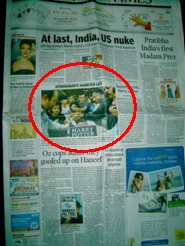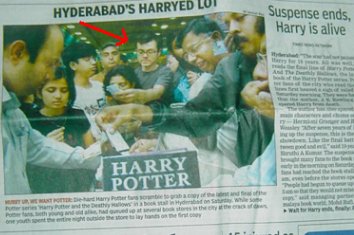Well, it was bound to happen sooner or later, though I hoped the lead photo would be Angela Lansbury presenting me with a Tony or Mayor Bloomberg presenting me with Angela Lansbury. Instead, if you look at the front page of The Times of India on Sunday, July 22, 2007, there I am at six in the morning at Hyderabad's Himalaya Book World, exhausted, irate, and cross-checking a little girl to get my copy of Harry Potter and the Deathly Hallows.
My violence against children (deserving children, I might add) is hardly an example of cultural insensitivity. Rather, cross-checking is the method that Indians use in place of lines. Whenever an institution really wants you to line up (e.g. the movie theater where I saw Harry Potter and the Order of the Phoenix in IMAX-3D for $4.75—eat that Loew's!), they'll have rows of railings so close together that cutting ahead is a physical impossibility. (Even standing between the railings is difficult unless you're anorexic which, given the cuisine here, I'm fast approaching.) Otherwise, you cut, you push, you sideswipe, and, yes, you cross-check until you get served. When I first came to India, I was new to physical violence, so I wasn't very good at getting to the front of lines. I couldn't even get served at the J. Pulla Reddy Candy Store despite there being more clerks than customers. However, after merely four weeks of practice, not only can I purchase candy, there I am in The Times of India, pushing my way to certain, infanticidal victory. And all for a book. But was it worth it? I won't discuss the plot of The Deathly Hallows (for 400 pages neither does Ms. Rowling), but I will mention that I had the British version, so, in addition to peculiar cover art and single-spaced text, I had to decipher sentences like, "Even in his mouldy pyjamas, Harry realised such a sceptical manoeuvre might not fulfil his centre of defence." I think "manoeuvre" is British for "fish and chips."
In celebration of my departure from the Hyderabad office (and I do mean celebration—they seemed quite glad to be rid of me), the Systems Department took me to Bottle and Chimney, whose philosophy is if you drink enough ("Bottle"), you won't notice the place smells like a gigantic cigarette ("Chimney"). To rally the drunken clientele, the DJ would shout things like, "What is the difference in i-node handling between the Solaris and non-Solaris builds of UNIX?" (Another gap in my liberal arts education: until that point, I had assumed i-nodes were an Apple product.) For reasons inexplicable, this quizzing soon became a raucous party where my co-workers proceeded to bump and grind with moves I hadn't seen since the company meeting/dance contest, denoted by appellations like "pluck the apple, pet the dog." Upon being invited to join the fray, I politely declined explaining that I graduated from high school precisely so I wouldn't have to attend this sort of event. Unfortunately, they didn't accept my excuses and pushed me to the middle of the floor, where they proceeded to ask for a demonstration of my copious dance talent. Now, the most contemporary dance I know is Donna McKechnie's solo from "Turkey Lurkey Time," and, the last time I attempted this, I overshot the high kick, plummeted to the floor, and couldn't rotate my left shoulder for a week. So after shouting something distracting (probably about i-nodes), I scurried to the side of the room to content myself with more vicarious forms of participation, such as being deafened by the music and smelling like an ashtray.
Soon, however, it was time to go our separate ways. Amid the hugs and handshakes, one of my co-workers mentioned he was sorry we didn't get the chance to play cricket together. (When training the Hyderabad Helpdesk, I copied the materials I had written for the New York office. To appeal to a local audience, however, I changed all mentions of "Angela Lansbury" to "cricket." This led the Hyderabad Helpdesk to think I was obsessed with cricket.) I echoed his sentiment as best I could (by lying) and headed home for my last night in the company apartment.
After the Harry Potter release, my driver and I exchanged what I think were goodbyes (I haven't ruled out his trying to sell me pearls; he did that a lot), and I boarded my first Indian train for my third Indian city: Mumbai. (At first, I assumed this was a typo of "Bombay"—the government rarely proofreads its signage as countless "No Spiting" advisories attest—but it's not! The Portuguese had originally named the city "Bombay." After winning their independence, the Indians wanted to prove they were now in charge of city naming but not change the name so much that people would be confused. So they settled on "Mumbai."
Incidentally, Indians love renaming stuff. Each street in Mumbai has three different names: what the guidebook says ("Main Street"), what the street signs say ("Barrister Shri Shrowpath Marg"), and what the locals call it (something like "ssdhfakjadhfkjhadsfgh"). These names very rarely intersect, which makes finding one's way to a particular location interesting at best. (My high school's hometown worked around this problem by naming every street "Atherton Avenue.") Despite the polynomial cartography, I saw a lot of stuff. Just rarely what I intended.
My first day in Mumbai, I caught a ferry to Elephanta Island. The Portuguese named this, too, though the Indians haven't gotten around to renaming it. (I recommend Angela Lansbury Island. Cricket Island, for you Indians.) Despite my disappointment that the titular elephant is (a) stone and (b) in absentia, I found the place like something out of Indiana Jones. Manmade caverns jut deep into mountain faces amid stretches of rain forest. Intricately decorated pillars and carvings of the Hindi gods fill the caves, as do guards who don't care if you take flash photos or vandalize the statues as long as you move to the right upon entering the room. (Guards in India are very fussy about crowd control. This is strange, as the rest of the country is devoted to shoving you against no fewer than seven people, all trying to sell you something.) On the paths outside the caves, monkeys participate in activities that leave no doubt as to their genders or their interest in the other monkeys.
Mumbai is itself an island, and the west side forms an enormous bay, bordered, in part, by Chowpatty Beach. When viewed from the downtown area, the water is absolutely beautiful, particularly at sunset. As you approach the beach, however, you wonder what that peculiar smell is, and, upon reaching the shore, you find the answer: raw sewage. The shore is invisible due all the refuse upon it, most of which served a sanitary purpose at some stage of its existence. Lonely Planet advises that one should not swim in the waters. I assume one should also not stick one's head under a moving vehicle.
Gandhi lived several blocks from Chowpatty Beach (part of his self-immolation campaign), and the house has since become a museum devoted to celebrating Gandhi's life in that most robust of mediums, the diorama. Now, Gandhi was obviously an amazing, selfless person, but the museum's methods reminded me of the Fidel Castro Museum which we saw on our high school chorus trip to Cuba (the one where Ms. Jordan had us sing Hanukkah songs on Passover). Both museums use propaganda as a shortcut to truth. In the Castro museum, for instance, exhibits include Castro's elementary school spelling test (A+) next to President Kennedy's (C-). In the Gandhi museum, whenever the word "British" appears, it's prefaced with "dastardly" or "nefarious," and, whenever the British are modeled in a diorama, there's a pile of bodies behind them. That's not to say the British weren't dastardly (cf. the thousands of Indians they massacred, Starlight Express) or President Kennedy a poor linguist ("Ich bein ein Berliner"), but museums need to provide more than tautological assertions. Even if they're in diorama form.
Finally, I might mention that, everywhere I go in Mumbai, people offer me substances of varying legality. I don't know why this occurs whenever I travel abroad (first Peru, now here). In America, aside from one instance in eighth grade, my friends have been neither cool nor generous enough to offer me drugs. But that was also in my pre-cross-checking days. Given recent press coverage, I expect my street cred to soar.
Continued >>
Indian newspapers don't believe in spoiler alerts.


No comments:
Post a Comment